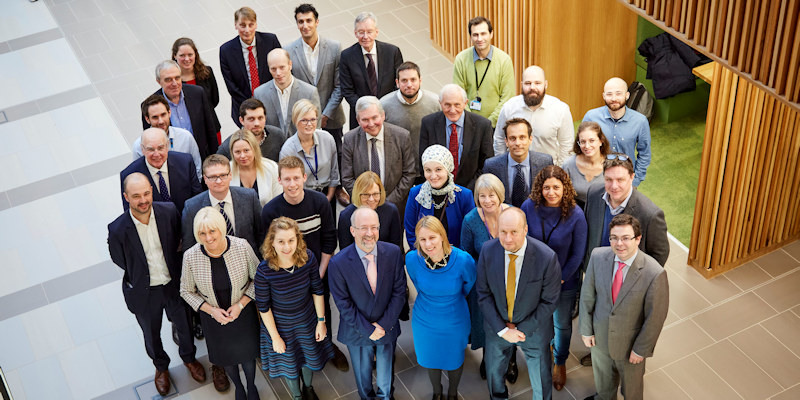
Senior leaders from Cancer Research UK visited the University today to find out how Leeds researchers are working together in the battle against the disease.
Academics from across a range of disciplines met the charity's Chief Executive, Michelle Mitchell, and four of its trustees to showcase their research, ranging from discovery science to large-scale clinical trials.
The delegation visited engineers, biologists, data scientists, clinicians and health researchers who are together trying to improve cancer treatments and quality of life for patients. Many of those researchers receive funding from Cancer Research UK to support their work.
"Leeds has a long history of excellent research in cancer."
The visit included a tour of the University's Astbury Centre for Structural Molecular Biology, which features two ten-foot high cryo-electron microscopes.
The Astbury facilities allow scientists to look at the molecular detail of how cells and organisms function, or how they malfunction in the case of cancer. Current projects include tackling the skin cancer Kaposi's sarcoma and using microbubbles to try to treat a range of cancers.

Michelle Mitchell from Cancer Research UK talks to Dr Natalia Riobo-Del Galdo from the School of Molecular and Cellular Biology
Michelle Mitchell, Chief Executive of Cancer Research UK, said: "Leeds has a long history of excellent research in cancer.
"It's incredibly impressive to see the breadth of science here at Leeds with a number of key specialisms, particularly looking at data science and AI, looking at discovery science and of course working with the NHS to put that into practice for people today.
"Cancer Research UK has a long history of partnership and funding here in Leeds, so I'm here today to see the fantastic work that's happening, to understand the partnerships that are in place and how we at CRUK will be putting together plans for our future together.
"I'm particularly pleased to see recent funding awarded to Leeds in three areas - radiotherapy, early detection and the Grand Challenge programme looking at the microbiome.
"These are three fantastic projects which demonstrate the extent to which Leeds' research is world-class.
"It's been great to understand how the University teams with the NHS to make sure that research continues to save lives today here in Leeds."
 The Cancer Research UK delegates with University of Leeds senior leaders and cancer researchers
The Cancer Research UK delegates with University of Leeds senior leaders and cancer researchers
Professor Lisa Roberts, Deputy Vice-Chancellor: Research and Innovation at the University of Leeds, said: "Cancer is a real priority area of research for Leeds and an area that we are proud to have significant and growing strength coupled with significant investment over recent years.
"Our close partnerships with health providers across the city ensure that Leeds' research is able to have a positive impact on society, and ultimately to improve and save lives.
"We now see an increasing opportunity to combine our strengths in biomedicine, clinical trials and novel therapies, and intelligent technologies. This will allow us to foster unique research and innovation initiatives to accelerate and improve our ability to bring better treatments to patients."

The delegation looking at the Astbury Centre microscopes
Spectrum of cancer research
One in two people will develop cancer during their lifetime. Leeds researchers are attempting to tackle cancer across a spectrum of biological, physical and engineering sciences:
- In the School of Electronic and Electrical Engineering, researchers are developing a colonoscopy robot to help enable earlier diagnosis, wider screening and more effective treatment for a variety of diseases including cancer;
- Biologists are using advanced imaging techniques to understand the molecular and cellular basis of cancer diseases to try and discover new targets for future therapies;
- Recent investment from Cancer Research UK has helped establish RadNet, which recognises Leeds as a Centre of Excellence for radiotherapy research;
- Leeds hosts a Cancer Research UK Clinical Trials Unit, which facilitates the design, delivery and analysis of trials that bring the latest scientific developments to patients across the UK;
- With colleagues at Leeds Teaching Hospitals NHS Trust academics are using artificial intelligence to transform how we diagnose cancer and other diseases through theNorthern Pathology Imaging Co-operative.

Leeds researchers are collaborating with Leeds Teaching Hospitals Trust to improve radiotherapy through RadNet






